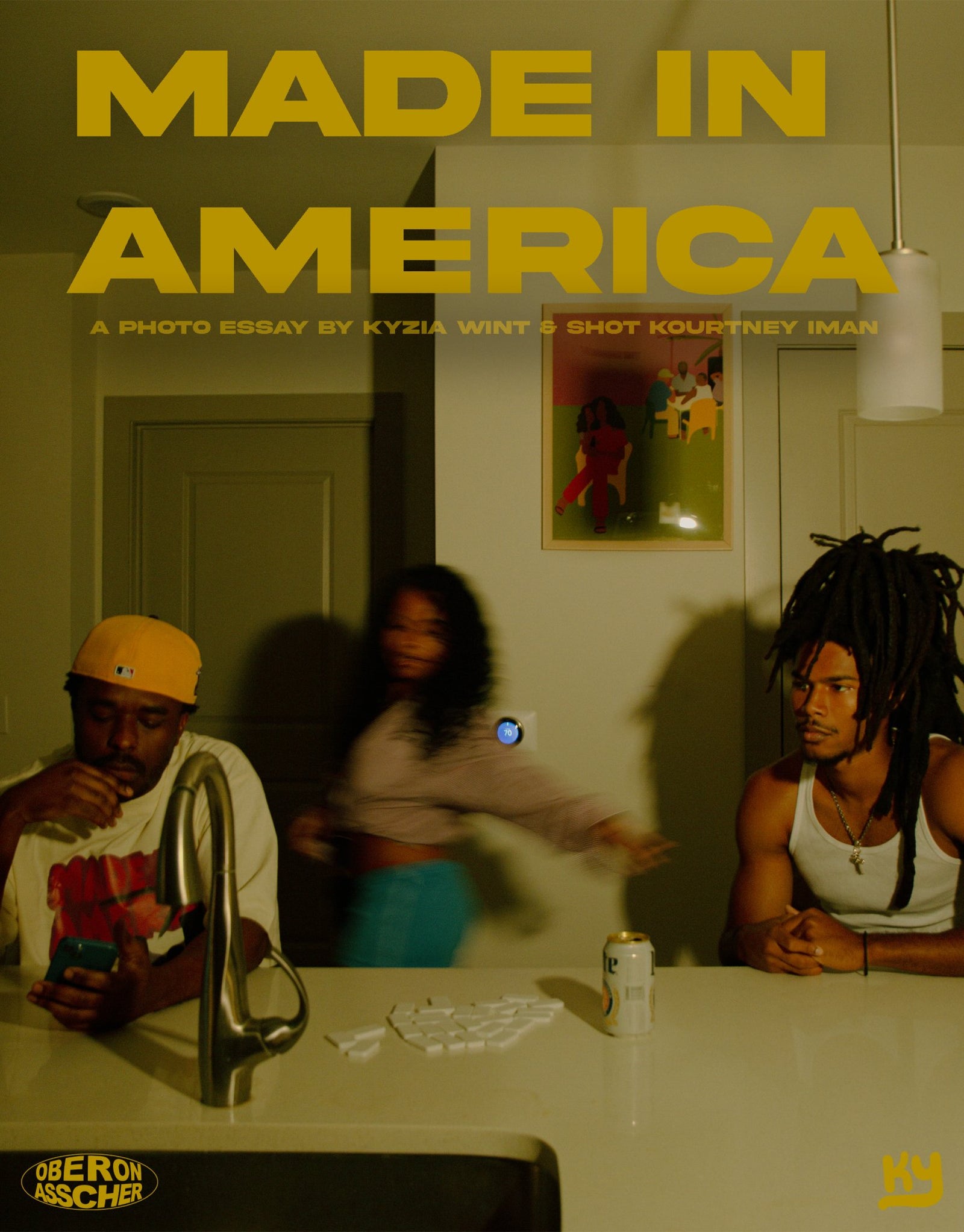An Introduction To : Made in America Artist exhibition By Kyzia Wint

Kyzia Wint details her photo essay as she gets ready for her first art exhibit presented by Oberon Asscher:
photos by Kourtney Iman.
"Made In America" is more than a collection of illustrations —it's a reflection of my journey and the collective experiences of first-generation Caribbean Americans. Growing up as the child of Jamaican immigrants, I've navigated the delicate balance between honoring my heritage and embracing the culture of the country I call home. This project is a homage to that upbringing and an exploration of how being first-generation has shaped my view of community, identity, and the world around me.
In creating this photo essay, I collaborated with talent who, like me, are first-generation Caribbean Americans. Through intimate portraits and their heartfelt responses to questions about heritage and tradition, we delve into what their culture means to them and the ways they keep it alive in their daily lives. Their stories highlight the importance of passing down traditions, the challenges of preserving one's roots in a new land, and the joy that comes from embracing a dual identity.
By sharing our narratives, we hope to spark conversations about the significance of heritage and the universal quest for belonging. "Made In America" celebrates the resilience, diversity, and vibrancy of first-generation individuals who continue to honor their past while forging their own paths forward.












WORDS FROM THE MODELS:
Greg : ( pictured with yellow hat)
- Caribbean heritage is unmatched. There are many differences in each country’s history as far as food, music, religion, language etc, but the history of each nation is rich , complex & truly resilient. It’s shaped me to be a confident black man who cares for my family and doesn’t let the obstacles of life detour me.
- Soup Joumou is a Haitian delicacy that’s enjoyed every New Year’s Day which happens to also be our Independence Day. It was a soup that slaves would make for their masters and couldn’t eat themselves so now that Haiti is an independent nation, Haitians celebrate by making their loved ones this delicious dish. My mother still makes it every year, makes a point we all bring in the new year with it in our bellies.
- My culture is instilled within me and my family so I never worry too much about losing my roots/identity. But if I ever feel lost, I make a point to surround myself with family and those worries usually subside.
- I just focus on being authentically me at this point. I used to struggle with the balancing act of being Haitian while also being a black American in this country. It’s been challenging identifying as one or the other but the joy is I have to different groups and f black people that root for me and vice versa
- To know where you’re going, you have to know where you’ve been. It would be very important that I pass down my Haitian identity to my children. A legacy I hope to leave is that I was a hospitable, passionate person who cared for and was loyal to his people.
Sashana Whyte (Lady)
1. Being a Jamaican-American young woman means that I cling to my identity as hard as I can. In a melting pot, it can be easy to get lost and blended into other social norms in the workplace, amongst my peers, in school, and in other social interactions. The Jamaican culture has so much warmth, so much selflessness, so much community, so much determination, so much spice and life and vibrancy, and I’ve found that those qualities that I’ve been able to hold onto have lifted me up in how I view that world and in how I live my life.
My heritage means that I am proud to carry on my father’s and my mother’s principles for the next generation to come, and when I raise my children in our Jamaican culture, I pray they will continue it on and on for generations to come.
2. Sunday dinners is one tradition that I love the most. For most of the week, we’ll fend for ourselves for food as we were all so busy with work and afterschool activities. But on Sundays, we’re having family dinner–snapper (all ways), brown stew chicken with rice and peas, curry chicken and white rice, cabbage, soup year-round (chicken, red peas), all of the beloved Jamaican meals.
Another tradition–and I’m probably going to continue mentioning food–is cooking fried snapper on Good Friday and getting good, warm, soft Ms. Birdie’s bun for the Easter time bun and cheese. Manish wata is a must for the New Year. As you can see I will eat until my heart’s content.
3. Well, I haven’t nailed down all of the family recipes as yet, so I like to focus on the Jamaican values that have been instilled in me and I consciously choose to stick by them to keep them alive. I open my arms to those who are in need, I work hard, I listen to good vibrational music, I spend a lot of time with family and friends, and I’m learning the family recipes NOW. Sunday dinners at Sashana’s house soon come.
4. I’ve found a lot of freedom in my American identity. I’ve found a lot of happiness in being able to love who I want to love, and doing that, without societal pressure, has been the biggest weight in the balance scale of my American and Jamaican identity. As a big plus, I’m very grateful and fortunate that it hasn’t been a challenge for me because my family doesn’t feel the need to own stock in that decision that I make for myself. Another joy that I’ve found in this balance is when some patois sneaks out when I’m talking and it brings up the “Where are you from?” part of the conversation. The other side of that sword though, is when my words come out too quickly and I have to restart because I formed a broken sentence.
5. I talk and think about legacy all day. Every day. Identity is a foundational block of human existence. Being able to place ourselves in this world means a lot to us, emotionally, financially, statistically, healthily, and especially traditionally. I recognize all the hard work that my mother, my father, my aunts, my uncles, and my grandparents put into moving to this country to afford a better life–ultimately for me. And what I do now will make their sacrifices ultimately for my
children, and then ultimately for my grandchildren, and so on. It is my hope to continue to build on the knowledge and wisdom that I was bestowed–the grit, the determination, the giving and loving nature–to form a legally protected entity to keep their names on it.

Artist Kyzia Wint & Oberon Founder Husani Spann






Leave a comment